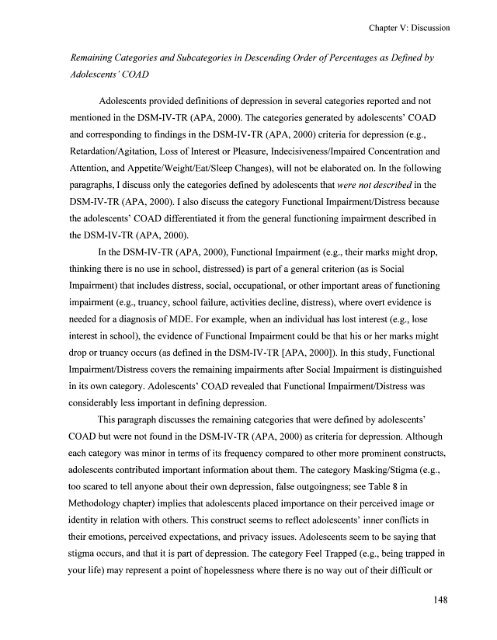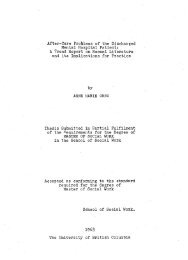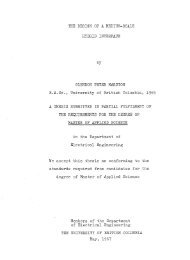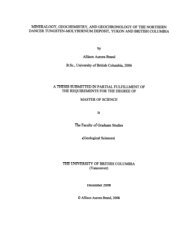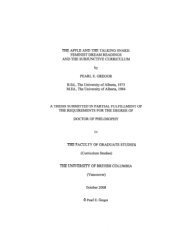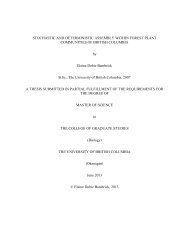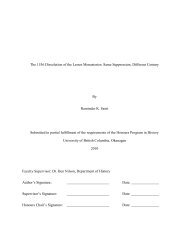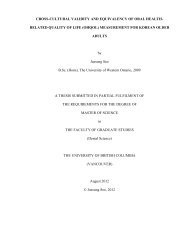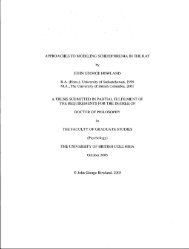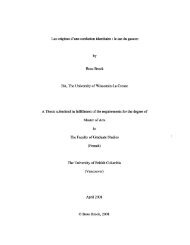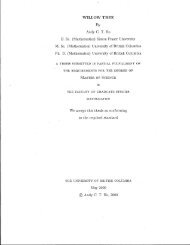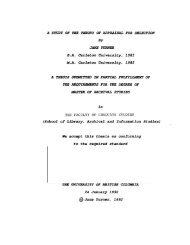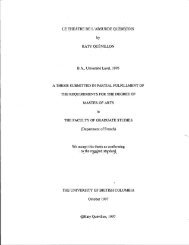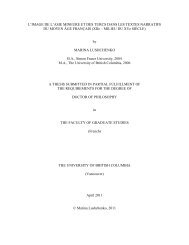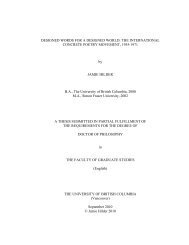how do adolescents define depression? - cIRcle - University of ...
how do adolescents define depression? - cIRcle - University of ...
how do adolescents define depression? - cIRcle - University of ...
Create successful ePaper yourself
Turn your PDF publications into a flip-book with our unique Google optimized e-Paper software.
Chapter V: Discussion<br />
Remaining Categories and Subcategories in Descending Order <strong>of</strong> Percentages as Defined by<br />
A<strong>do</strong>lescents' COAD<br />
A<strong>do</strong>lescents provided definitions <strong>of</strong> <strong>depression</strong> in several categories reported and not<br />
mentioned in the DSM-IV-TR (APA, 2000). The categories generated by a<strong>do</strong>lescents' COAD<br />
and corresponding to findings in the DSM-IV-TR (APA, 2000) criteria for <strong>depression</strong> (e.g.,<br />
Retardation/Agitation, Loss <strong>of</strong> Interest or Pleasure, Indecisiveness/Impaired Concentration and<br />
Attention, and Appetite/Weight/Eat/Sleep Changes), will not be elaborated on. In the following<br />
paragraphs, I discuss only the categories <strong>define</strong>d by a<strong>do</strong>lescents that were not described in the<br />
DSM-IV-TR (APA, 2000). I also discuss the category Functional Impairment/Distress because<br />
the a<strong>do</strong>lescents' COAD differentiated it from the general functioning impairment described in<br />
the DSM-IV-TR (APA, 2000).<br />
In the DSM-IV-TR (APA, 2000), Functional Impairment (e.g., their marks might drop,<br />
thinking there is no use in school, distressed) is part <strong>of</strong> a general criterion (as is Social<br />
Impairment) that includes distress, social, occupational, or other important areas <strong>of</strong> functioning<br />
impairment (e.g., truancy, school failure, activities decline, distress), where overt evidence is<br />
needed for a diagnosis <strong>of</strong> MDE. For example, when an individual has lost interest (e.g., lose<br />
interest in school), the evidence <strong>of</strong> Functional Impairment could be that his or her marks might<br />
drop or truancy occurs (as <strong>define</strong>d in the DSM-IV-TR [APA, 2000]). In this study, Functional<br />
Impairment/Distress covers the remaining impairments after Social Impairment is distinguished<br />
in its own category. A<strong>do</strong>lescents' COAD revealed that Functional Impairment/Distress was<br />
considerably less important in defining <strong>depression</strong>.<br />
This paragraph discusses the remaining categories that were <strong>define</strong>d by a<strong>do</strong>lescents'<br />
COAD but were not found in the DSM-IV-TR (APA, 2000) as criteria for <strong>depression</strong>. Although<br />
each category was minor in terms <strong>of</strong> its frequency compared to other more prominent constructs,<br />
a<strong>do</strong>lescents contributed important information about them. The category Masking/Stigma (e.g.,<br />
too scared to tell anyone about their own <strong>depression</strong>, false outgoingness; see Table 8 in<br />
Metho<strong>do</strong>logy chapter) implies that a<strong>do</strong>lescents placed importance on their perceived image or<br />
identity in relation with others. This construct seems to reflect a<strong>do</strong>lescents' inner conflicts in<br />
their emotions, perceived expectations, and privacy issues. A<strong>do</strong>lescents seem to be saying that<br />
stigma occurs, and that it is part <strong>of</strong> <strong>depression</strong>. The category Feel Trapped (e.g., being trapped in<br />
your life) may represent a point <strong>of</strong> hopelessness where there is no way out <strong>of</strong> their difficult or<br />
148


